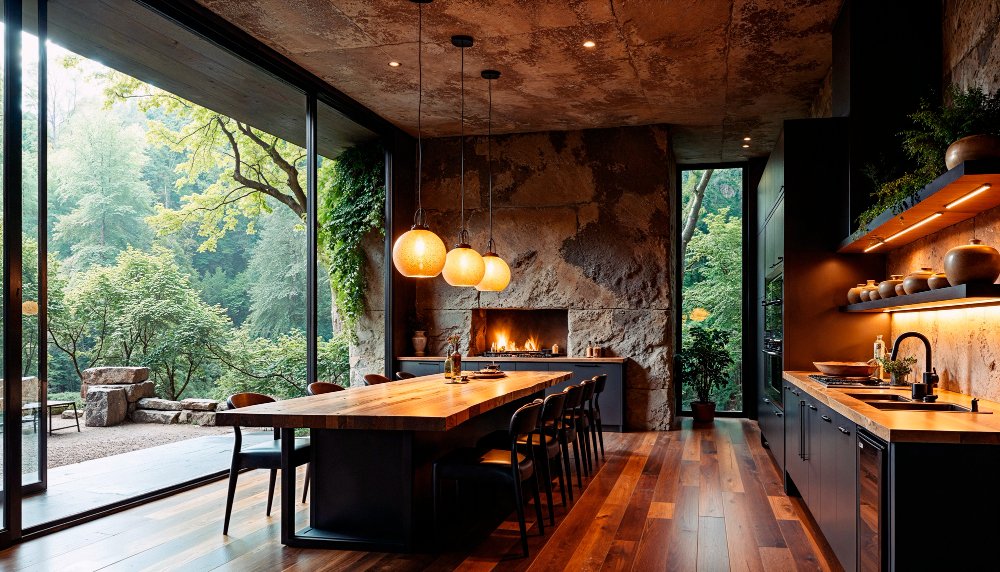Biophilic design is a growing trend that brings nature into living spaces, enhancing well-being, relaxation, and overall harmony. Whether you live in an urban apartment or a suburban home, integrating natural elements into modern interiors creates a soothing and visually appealing environment. Here’s how to achieve a balance between modern elegance and nature with biophilic design principles.
1. Maximize Natural Light for a Brighter, Healthier Home
Why It Works:
Natural light enhances mood, productivity, and energy efficiency.
✅ Install large windows and skylights to bring in more daylight.
✅ Use sheer curtains or adjustable blinds to control brightness without blocking sunlight.
✅ Incorporate mirrors to reflect light and distribute it throughout the space.
📌 Wellness Tip: Exposure to natural light regulates circadian rhythms, improving sleep and overall health.
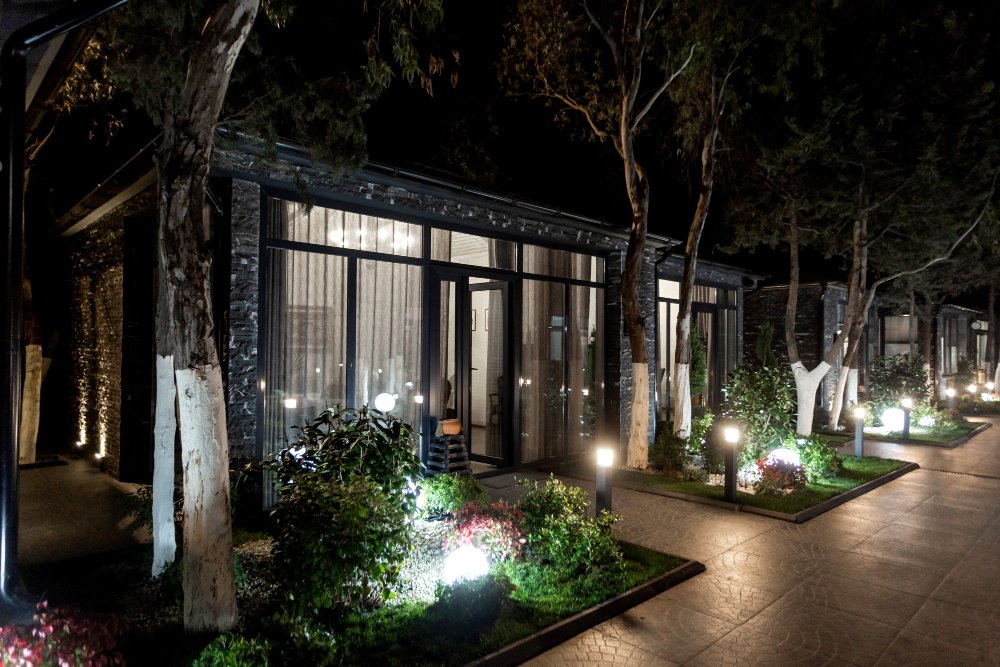
2. Bring the Outdoors Inside with Plants & Greenery
Why It Works:
Indoor plants improve air quality, reduce stress, and add natural beauty to interiors.
✅ Choose low-maintenance houseplants like snake plants, pothos, and peace lilies.
✅ Use vertical gardens or hanging planters to maximize greenery in small spaces.
✅ Incorporate herb gardens in the kitchen for both function and aesthetics.
📌 Eco-Friendly Bonus: Plants help absorb toxins and increase oxygen levels, making indoor air healthier.
3. Use Natural Materials for a Timeless Look
Why It Works:
Materials inspired by nature bring warmth, texture, and sustainability into modern spaces.
✅ Opt for wooden furniture and accents for a warm, organic touch.
✅ Use stone countertops, clay tiles, or marble finishes for an elegant aesthetic.
✅ Incorporate woven fibers like jute, bamboo, and rattan for a cozy, natural feel.
📌 Sustainable Tip: Choose reclaimed wood or ethically sourced materials for a more eco-friendly approach.
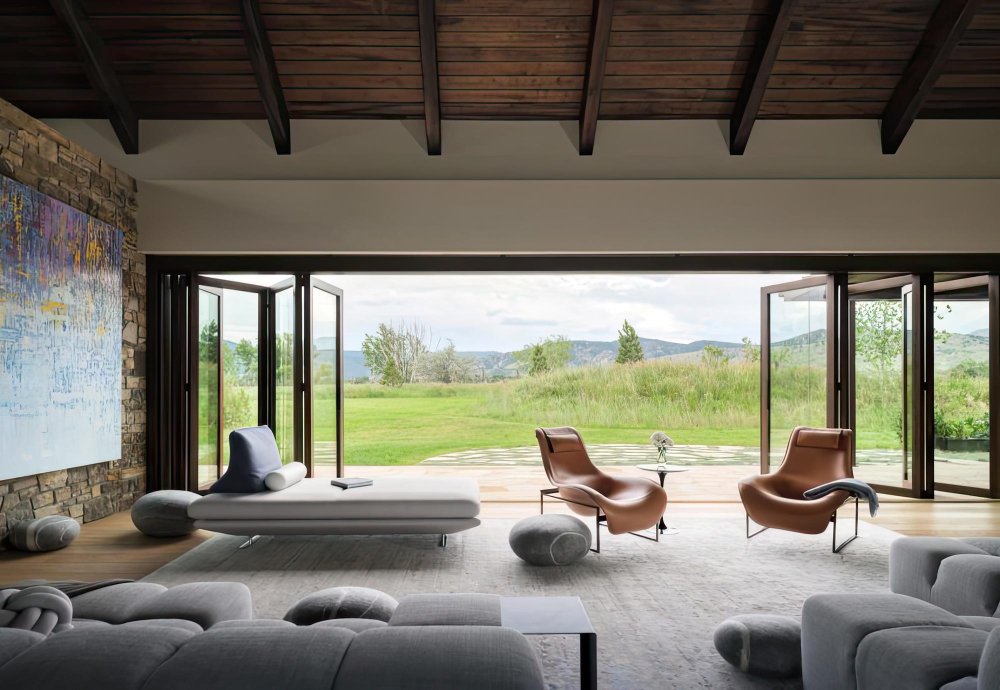
4. Incorporate Water Features for Serenity
Why It Works:
Water elements create a calming ambiance and promote relaxation.
✅ Add an indoor tabletop fountain for soothing background sounds.
✅ Install a mini pond or waterfall in your outdoor space.
✅ Use aquariums as living decor to introduce movement and tranquility.
📌 Mindfulness Tip: The sound of flowing water reduces stress and enhances focus, making it ideal for home offices and relaxation areas.
5. Create Seamless Indoor-Outdoor Transitions
Why It Works:
Blurring the lines between indoor and outdoor spaces makes a home feel larger and more connected to nature.
✅ Use sliding glass doors to open up interiors to gardens or patios.
✅ Extend living areas with outdoor seating, pergolas, and shaded retreats.
✅ Bring in natural textures like stone and wood to blend indoor and outdoor aesthetics.
📌 Design Hack: Position furniture near windows or balconies to enhance the feeling of being surrounded by nature.
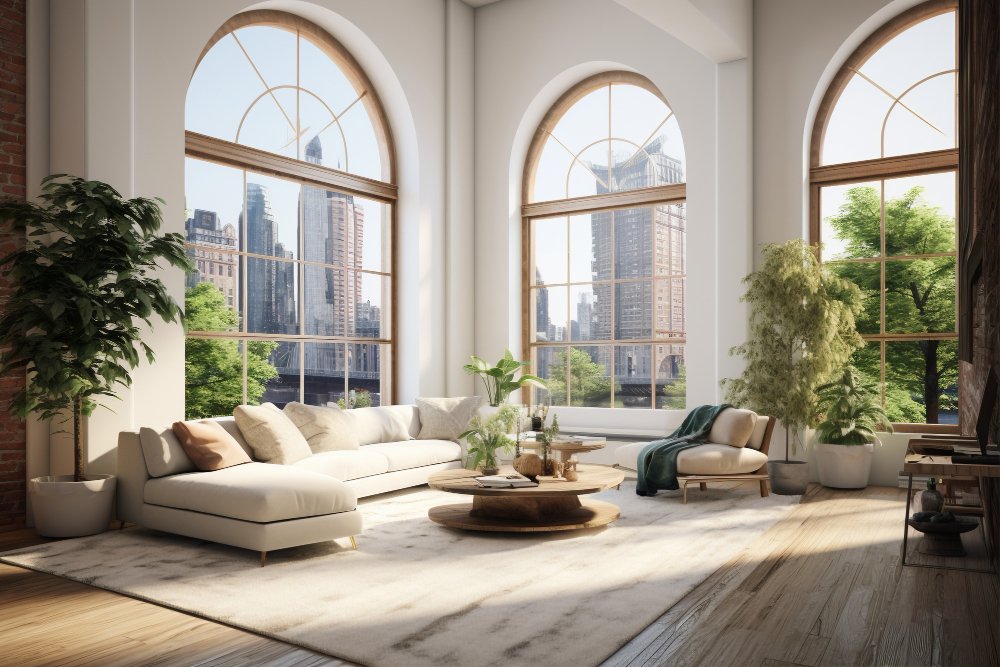
6. Choose a Natural Color Palette
Why It Works:
Earthy hues create a calm and welcoming atmosphere while maintaining modern elegance.
✅ Stick to neutral tones like beige, soft browns, and muted greens.
✅ Incorporate natural blues and warm terracotta for an earthy contrast.
✅ Use wood stains and stone finishes to enhance the organic aesthetic.
📌 Color Psychology: Soft, nature-inspired colors can promote relaxation and mental clarity.
Read More in Shaded House Blog
- Vinyl Plank Flooring, Step by Step: Style, Prep, and Precision
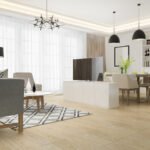 Vinyl plank flooring delivers the look of high-end wood or stone with durability and ease. In this step-by-step guide inspired by Vern Yip’s precise and stylish approach, discover how to choose the right planks, prepare your subfloor, and install with confidence. With smart planning, design-conscious layout tips, and a clear installation process, you’ll create a floor that not only performs—but beautifully anchors your space. Ideal for DIYers and homeowners looking to upgrade with elegance and intention.
Vinyl plank flooring delivers the look of high-end wood or stone with durability and ease. In this step-by-step guide inspired by Vern Yip’s precise and stylish approach, discover how to choose the right planks, prepare your subfloor, and install with confidence. With smart planning, design-conscious layout tips, and a clear installation process, you’ll create a floor that not only performs—but beautifully anchors your space. Ideal for DIYers and homeowners looking to upgrade with elegance and intention. - The Wall Surrounds That Gave My Bathroom Soul
 Sometimes, it’s not about overhauling a space—it’s about revealing its potential. In this story-driven piece inspired by Martha Stewart’s signature grace and detail, we explore how elegant wall surrounds turned a purely functional bathroom into a soulful retreat. With refined materials, soothing tones, and practical luxury, the transformation became more than surface-deep. Learn how thoughtful design choices can bring warmth, simplicity, and a sense of self to the most private corners of the home.
Sometimes, it’s not about overhauling a space—it’s about revealing its potential. In this story-driven piece inspired by Martha Stewart’s signature grace and detail, we explore how elegant wall surrounds turned a purely functional bathroom into a soulful retreat. With refined materials, soothing tones, and practical luxury, the transformation became more than surface-deep. Learn how thoughtful design choices can bring warmth, simplicity, and a sense of self to the most private corners of the home. - Kitchen Cabinet Showrooms: Are You Ready for This (Beautiful) Chaos?
 From ‘Toffee Twilight’ identity crises to judging drawer glides like Olympic events, Candice Olson decodes the cabinet showroom experience. Discover why GENESIS Natural Stain wins hearts and how to spot ‘the one’ when you see it.
From ‘Toffee Twilight’ identity crises to judging drawer glides like Olympic events, Candice Olson decodes the cabinet showroom experience. Discover why GENESIS Natural Stain wins hearts and how to spot ‘the one’ when you see it.
Final Thoughts
Biophilic design is more than just adding plants to a room—it’s about creating a home that fosters connection with nature while maintaining a modern, sophisticated look. By integrating natural light, organic materials, water elements, and seamless transitions between indoor and outdoor spaces, you can design a living environment that enhances well-being, boosts relaxation, and promotes sustainability. Start small with a few green accents or go big with nature-inspired architecture—every step toward biophilic design brings you closer to a healthier, more harmonious home!

